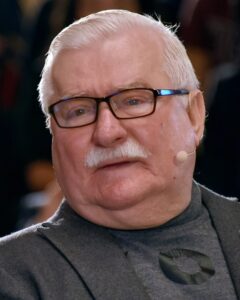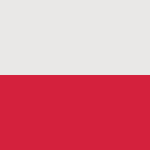Lech Wałęsa
Born in 1943.
Lech Walęsa is … former Polish president, Nobel Peace Prize winner, admired in Western Europe and the USA. In Poland, he is admired by a few, respected by many and hated by some.
Lech Walęsa is… a difficult person to describe.
Electrician and strike leader
He worked as an electrician at Gdansk Shipyard since 1967, after completing his military service. Served on the strike committee for the 1970 strikes. He was a co-founder of the free trade union Solidarity and the driving force behind the agreement that in August 1980, after a series of strikes, led to an agreement on free trade unions in Poland.
Nobel Peace Prize
Interned after martial law in December 1981, when Solidarity was declared illegal. In 1983, he was awarded the Nobel Peace Prize for implementing peaceful systemic change.
The communists try to get Walęsa on their team
Walęsa’s activities in the opposition continued throughout the 1980s, and in 1988-1989 he was appointed by Poland’s then dictator Jaruzelski as the government’s primary negotiating partner in the attempt to bring about national reconciliation. The government’s plan was to make Solidarity part of the legal basis of government and thus give them co-responsibility for the situation in Poland.
It was a plan that failed – the situation got out of hand and a lot of ideas suddenly started to emerge. At the time, Walęsa and Solidarity did not have a clear plan for the future Poland, but rather some ideas about decentralisation and cooperative business management instead of the centralism that communist Poland was characterised by at the time. However, the 1989 election was a landslide, with Solidarity winning almost all the seats in the newly formed Senate and the maximum one-third of the seats in the Sejm. There are several reasons for this election result, but the government’s passive line towards a future co-operation partner was one of them, combined with Solidarity’s modern and effective campaign.

The result, however, was that some of the Communist Party’s co-operative partners switched to Solidarity, after which the opposition formed a government. In 1990, Lech Walęsa became president after former dictator Jaruzelski voluntarily stepped down.
Walęsa has lots of children
In the meantime, Lech and his wife Danuta had 8 children, most of whom have struggled with crime, alcohol, life or other social problems. However, one son has gone on to a political career. There have never been any accusations against Walęsa in relation to his private life, except that he has been away from his family a lot due to his political involvement.
Loses bid for re-election as president
In 1995, Walęsa lost the presidential election to the representative of the post-communist bloc, Aleksander Kwasniewski. It was a hateful election campaign, but they have since become great friends.
A fighter with problems
Walęsa is a brilliant fighter and unrivalled as a political leader in a transitional situation. He is good at speaking in simple language, has an intuitive feel for a wide range of issues and is a skilled organiser.
His problems internally in Poland have come from an inflated ego. He has had excellent advisors, but has relied more on his own judgement and has alienated many people with his arrogant behaviour. Educated people also believe that his language can be primitive and full of grammatical errors, although it has improved with age. Since leaving the presidency, he has also been known to make some mildly odd statements, many of which are probably taken out of context. He has regained recognition from the western-orientated wing over the past eight years through his opposition to the PiS government’s judicial reforms and his fight for the Constitution. On the other hand, the nationalist wing during this period did everything they could to write him out of history.
Was the round table a broad demonstration of brotherhood or bipartisan talks?
Walęsa has been accused by parts of the political landscape of holding bipartisan talks with the communist rulers in order to share power. It cannot be ruled out that this is correct. The Round Table was a theatre, and the real negotiations were conducted between the government and Walęsa. If it had gone the way Jaruzelski had planned at the time, things would have turned out very differently.
However, it didn’t, and we don’t know what role Walęsa would have had if the election had gone differently. However, we do know that Walęsa seized the opportunity and changed the system when he had the chance, both in 1981 and in 1989, and again in 1990 when Jaruzelski stepped down as president. From 1991, Poland had completely free elections, and Walęsa had a decisive role to play in this.
Alleged co-operation with the security services
Another charge levelled against Walęsa has been the accusation of collaboration with the security services under communism. Walęsa probably signed some declarations of co-operation with the secret police sometime in the 1970s. It often happened in connection with arrests that people had such papers placed in front of them with instructions to sign if they didn’t want to go back to their cell. Most of them signed. Walęsa himself does not deny that he has signed something. However, this does not mean that he has co-operated with the security services and there is no evidence of this. But the topic is still alive and being discussed in Poland. However, it is politically charged and people’s views on it are closely tied to their political views.
Please send an email to m@hardenfelt.pl if you would like an English-speaking tour guide to show you the most important places in Warsaw.
